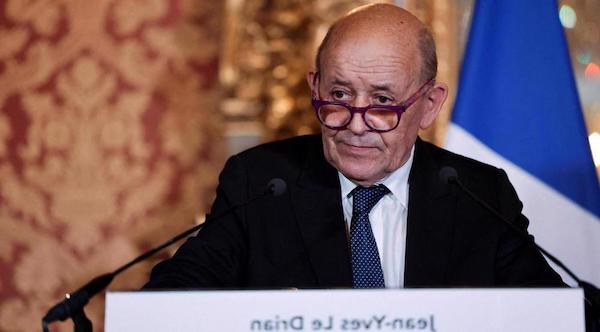
French Foreign Minister Jean-Yves Le Drian (photo by Reuters)
French Foreign Minister Jean-Yves Le Drian has spoken against US insistence that Russia is set to invade neighboring Ukraine, saying there are no current indications to that effect, as more Europeans move to avert another US-led row with Moscow.
The remarks by Franceís top diplomat came during a Wednesday interview with France 2 Television after Russian President Vladimir Putin censured Western governments on Tuesday for deliberately generating a scenario intended to lure his country into a war over Ukraine while ignoring Russiaís security concerns about aggressive plans by the US-led NATO military alliance to expand closer to Russian borders.
Relations between Russia and the West have hit a new low in recent weeks as Washington, its NATO allies, and the Western-backed administration in Kiev have engaged in a massive publicity campaign accusing Russia, accusing it of planning an invasion of Ukraine by amassing troops near its border with that country. Moscow has denied harboring such plans, noting that it reserves the right to shift troops around within its own borders as a defensive posture in face of growing NATO war games nearby.
Le Drian made the remarks a day after Putin said the US had ignored Moscowís key concerns in its written response to Russian demands for legally binding security guarantees aimed at easing tensions with the West over Ukraine.
French President Emmanuel Macron last month called for the EU to conduct its own dialog with Russia rather than supporting diplomatic efforts led by Washington and NATO.
Russiaís Foreign Minister Sergey Lavrov warned last week that Moscow would take unspecified "appropriate measures" if Washington and member nations of the military alliance refused to provide Russia with the security guarantees it was seeking.
As the US continues its hawkish policies against Russia and threatening unprecedented economic sanctions on the country in case of a Ukraine invasion, some European countries have voiced serious reservations about fueling further hostilities with Moscow.
Germany, for instance, has refused to export weapons to Ukraine despite efforts by other NATO member nations, including the US, to ship arms to the country in the purported bid to resist a possible Russian invasion.
This is while Germany remains one of the worldís top arms producers and exporters, with sales increasing 21% from 2016 to 2020.
Hungaryís Prime Minister Viktor Orban on Friday dealt another blow to the US campaign when he said his country would seek to increase the amount of gas it receives from Russia. Hungary, a member of the European Union and NATO, signed a new long-term gas supply agreement with Russiaís Gazprom in August.
NATO and Britain have also said that they have no plans to deploy troops to Ukraine in the event of a Russian invasion.
NATO Secretary General Jens Stoltenberg pointed out on Sunday that Ukraine is not a NATO member, suggesting that the situation would have been different if the country was a member of the military alliance.
British Foreign Secretary Liz Truss made similar remarks, saying it was very unlikely that British soldiers would be sent to fight alongside Ukrainian troops in the event of a Russian invasion.
British Prime Minister Boris Johnson, however, accused Russia of "destabilizing" the situation around Ukraine, insisting that London was planning to offer NATO a "major" deployment of troops and military hardware in Eastern Europe.
His announcement came after US President Joe Biden declared on Friday he would soon deploy American military forces to Eastern Europe.
The decision by the US and Britain to send troops also came after Ukrainian President Volodymyr Zelensky urged Western leaders to avoid stirring "panic," stating that their warmongering was placing a heavy burden on the Ukrainian economy. Zelensky further hailed the outcome of talks between senior Russian and Ukrainian officials in Paris earlier this week.
Envoys from Moscow and Kiev agreed after talks last week that all parties should observe a ceasefire in the east of Ukraine, where government forces have been battling ethnic Russians since 2014.
Ukraineís leaders also reassured the nation last week that a war was not imminent despite Bidenís recent claims that Russia "continues to build forces along Ukraineís border" in preparation for "the largest invasion since World War II."
LINK: https://www.ansarpress.com/english/26627
TAGS:






























 online news tv
online news tv




